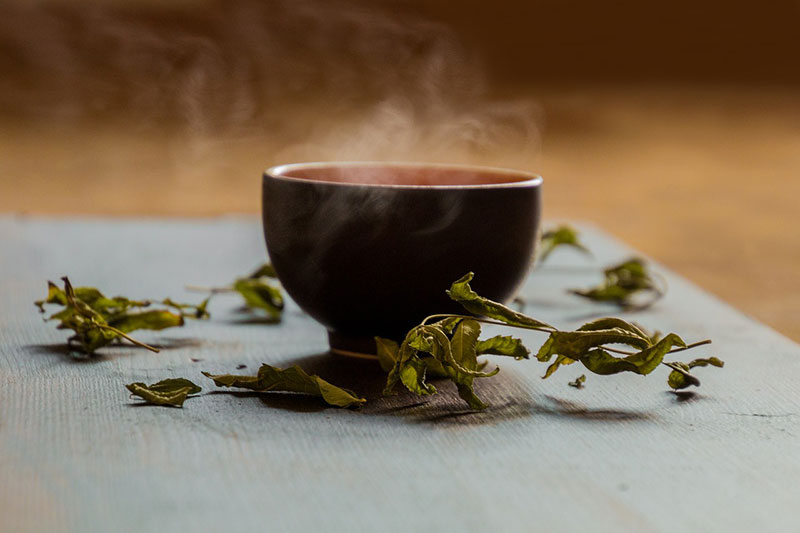If tea is such as a powerful drink that may help with treating hundreds of health conditions – from allergies and blood pressure to helping in cancer treatments and weight management–can it do anything for Crohn’s disease? Let’s find out.
The health benefits of tea
Regardless if you are a regular or occasional tea drinker, the potential benefits of tea may still be quite a mystery. Tea is a healthy drink for many reasons. Firstly, if you enjoy drinking sugary drinks and switch to tea, you will usually ingest far less sugar. Once you get accustomed to all these wonderful new flavors, and your taste buds start recognizing the hidden notes in different types of tea, you will probably start avoiding sweeteners all together. Next, there are potential benefits linked to all types of real tea made from Camellia sinensis tea plants. Some are backed by science, some are still only the assumptions, but many of them may provide optimism to tea drinkers. There certainly is much goodness in a drink beloved by so many people on this planet. Besides Camellia sinensis, there are thousands of other plants, herbs and roots that are used for making herbal teas. They may provide numerous benefits too.

What is Crohn’s disease?
Crohn’s disease is an inflammatory disease that affects gastrointestinal tract[1]. It can cause diarrhea, abdominal cramps, constipation and other symptoms[2] that may be unpleasant and make daily activities difficult, if not impossible. With gastrointestinal problems, making the right food and drinking choices is always of the utmost importance.
Can tea help with Crohn’s disease?
Tea contains polyphenols, chlorophyl, caffeine, vitamins, minerals and other compounds. All real teas are made from the same plant – Camellia sinensis. Out of all 6 main types of tea, green tea is often mentioned as the healthiest one. However, that depends on what kind of benefits in tea you are looking for. If you suffer from Chron’s disease, studies suggest that tea may help:
- 1. Switching from drinks with high levels of sugar is always a good choice, even for healthy people. Studies showed that high sugar intake may cause a microbial imbalance and colitis, another inflammatory bowl disease[3]. Furthermore, high quality loose leaf tea has a lot of flavor. It’s a great alternative to water.
- 2. Tea contains anti inflammatory and antioxidant properties[4]. Because Chron’s disease is a chronic inflammation of the gastrointestinal tract, tea, especially EGCg[5] may help reduce the severity of symptoms[6]. EGCg is usually most abundantly found in green tea, such as matcha tea powder or Sencha or white tea such as White Peony.
- 3. Some studies suggest that EGCg in tea may reduce the appetite[7]. This may be beneficial as the higher intake of sweet and oily food may increase the risk of Chron’s disease[8]. Potentially, a cup of tea might keep you away from snacking between meals.
How to choose the best tea
All teas contain antioxidants. However, antioxidants in green tea differ from antioxidants in black tea. The level of antioxidants in your cup will depend on many factors. Some of them are under your control and some aren’t. For example, the way you brew your tea will cause more or less catechins being extracted into your cup. That’s why a cup of Japanese matcha green tea may contain more antioxidants than a cup of other green tea–because you dilute the powdered tea, rather than steeping it. However, keep in mind that caffeine may start[9] or worsen diarrhea[10]. Some green teas contain low levels of caffeine, for example, bancha and hojicha. Lightly oxidized oolong teas may be a great choice too, and most of them might have less caffeine than many green teas–for example, Tie Guan Yin.
Another important suggestion it to avoid drinking tea with meals rich in iron as studies suggest iron may diminish the potential benefits of tea antioxidants[11] and the other way around–tea may reduce the iron absorption[12]. Avoid drinking tea straight after meals.
How about herbal teas?
Herbal teas are generally considered a good choice for people suffering from Chron’s disease. They are usually caffeine free and may provide antioxidant and anti inflammatory activity too. The best tea? Rooibos. It’s caffeine free, rich in antioxidants and may provide anti-inflammatory properties. Rooibos is made from a south African plant called Aspalathus linearis. It’s available in two forms–fermented and non-fermented. Fermented rooibos has an intense orange-red color and an earthy flavor, while the non-fermented rooibos is very similar to green tea–except it has zero astringency.
Other great herbal teas for Chron’s disease include turmeric, ginger, and fennel. In fact, many spices could help with inflammatory diseases[13]. For example, ginger may help relieve inflammation[14] and stomach nausea. Studies showed that turmeric may reduce the symptoms of inflammatory bowl diseases[15] too. You can simply add turmeric powder to your favorite blend. Try it with black Hollywood Chai or herbal Gingerbread Chai.
Just like with anything you drink or eat moderation is an answer. Although tea may provide a lot of benefits, each and every person is different. Start with a cup first and see how your body will react. And finally, always consult your doctor before changing your diet, especially if you already suffer from Chron’s disease.
Sources:
[1] https://www.crohnscolitisfoundation.org/what-is-crohns-disease
[2] https://www.crohnscolitisfoundation.org/what-is-crohns-disease/symptoms
[3] https://www.nature.com/articles/s41598-019-48749-2
[4] https://www.researchgate.net/publication/323703236_Treatment_of_inflammatory_bowel_disease_via_green_tea_polyphenols_possible_application_and_protective_approaches
[5] https://grantome.com/grant/NIH/R21-AT001490-01A1
[6] https://www.ncbi.nlm.nih.gov/pmc/articles/PMC5490540/
[7] https://www.uchicagomedicine.org/forefront/news/green-tea-derivative-causes-loss-of-appetite-weight-loss-in-rats
[8] https://www.nature.com/articles/s41598-020-64024-1
[9] https://www.crohnscolitisfoundation.org/sites/default/files/legacy/assets/pdfs/diet-nutrition-2013.pdf
[10] https://www.crohnsandcolitis.org.uk/about-crohns-and-colitis/publications/food
[11] https://ibdnewstoday.com/2016/03/14/ibd-mouse-study-shows-drinking-green-tea-iron-rich-meal-diminishes-teas-benefits/
[12] https://www.crohnsandcolitis.org.uk/about-crohns-and-colitis/publications/food
[13] https://www.ncbi.nlm.nih.gov/pmc/articles/PMC5785894/
[14] https://ibdnewstoday.com/pinterest/2016/10/13/inflammatory-bowel-disease-ginger-turmeric-tea/
[15] https://www.stlukes-stl.com/health-content/medicine/33/000043.htm



Leave a Reply Cancel Reply